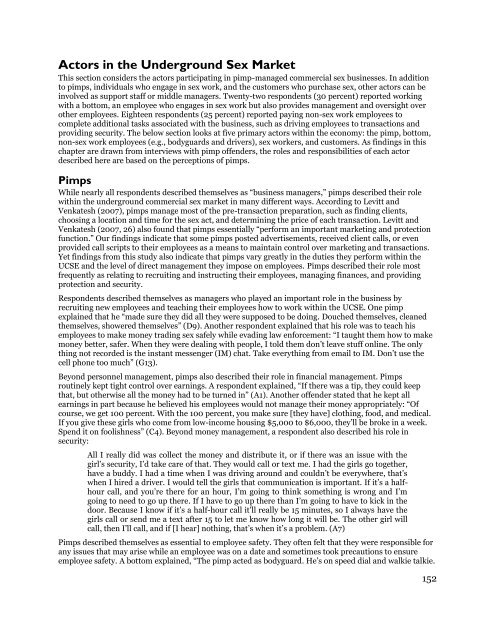413047-Underground-Commercial-Sex-Economy
413047-Underground-Commercial-Sex-Economy
413047-Underground-Commercial-Sex-Economy
You also want an ePaper? Increase the reach of your titles
YUMPU automatically turns print PDFs into web optimized ePapers that Google loves.
Actors in the <strong>Underground</strong> <strong>Sex</strong> Market<br />
This section considers the actors participating in pimp-managed commercial sex businesses. In addition<br />
to pimps, individuals who engage in sex work, and the customers who purchase sex, other actors can be<br />
involved as support staff or middle managers. Twenty-two respondents (30 percent) reported working<br />
with a bottom, an employee who engages in sex work but also provides management and oversight over<br />
other employees. Eighteen respondents (25 percent) reported paying non-sex work employees to<br />
complete additional tasks associated with the business, such as driving employees to transactions and<br />
providing security. The below section looks at five primary actors within the economy: the pimp, bottom,<br />
non-sex work employees (e.g., bodyguards and drivers), sex workers, and customers. As findings in this<br />
chapter are drawn from interviews with pimp offenders, the roles and responsibilities of each actor<br />
described here are based on the perceptions of pimps.<br />
Pimps<br />
While nearly all respondents described themselves as “business managers,” pimps described their role<br />
within the underground commercial sex market in many different ways. According to Levitt and<br />
Venkatesh (2007), pimps manage most of the pre-transaction preparation, such as finding clients,<br />
choosing a location and time for the sex act, and determining the price of each transaction. Levitt and<br />
Venkatesh (2007, 26) also found that pimps essentially “perform an important marketing and protection<br />
function.” Our findings indicate that some pimps posted advertisements, received client calls, or even<br />
provided call scripts to their employees as a means to maintain control over marketing and transactions.<br />
Yet findings from this study also indicate that pimps vary greatly in the duties they perform within the<br />
UCSE and the level of direct management they impose on employees. Pimps described their role most<br />
frequently as relating to recruiting and instructing their employees, managing finances, and providing<br />
protection and security.<br />
Respondents described themselves as managers who played an important role in the business by<br />
recruiting new employees and teaching their employees how to work within the UCSE. One pimp<br />
explained that he “made sure they did all they were supposed to be doing. Douched themselves, cleaned<br />
themselves, showered themselves” (D9). Another respondent explained that his role was to teach his<br />
employees to make money trading sex safely while evading law enforcement: “I taught them how to make<br />
money better, safer. When they were dealing with people, I told them don’t leave stuff online. The only<br />
thing not recorded is the instant messenger (IM) chat. Take everything from email to IM. Don’t use the<br />
cell phone too much” (G13).<br />
Beyond personnel management, pimps also described their role in financial management. Pimps<br />
routinely kept tight control over earnings. A respondent explained, “If there was a tip, they could keep<br />
that, but otherwise all the money had to be turned in” (A1). Another offender stated that he kept all<br />
earnings in part because he believed his employees would not manage their money appropriately: “Of<br />
course, we get 100 percent. With the 100 percent, you make sure [they have] clothing, food, and medical.<br />
If you give these girls who come from low-income housing $5,000 to $6,000, they’ll be broke in a week.<br />
Spend it on foolishness” (C4). Beyond money management, a respondent also described his role in<br />
security:<br />
All I really did was collect the money and distribute it, or if there was an issue with the<br />
girl’s security, I’d take care of that. They would call or text me. I had the girls go together,<br />
have a buddy. I had a time when I was driving around and couldn’t be everywhere, that’s<br />
when I hired a driver. I would tell the girls that communication is important. If it’s a halfhour<br />
call, and you’re there for an hour, I’m going to think something is wrong and I’m<br />
going to need to go up there. If I have to go up there than I’m going to have to kick in the<br />
door. Because I know if it’s a half-hour call it’ll really be 15 minutes, so I always have the<br />
girls call or send me a text after 15 to let me know how long it will be. The other girl will<br />
call, then I’ll call, and if [I hear] nothing, that’s when it’s a problem. (A7)<br />
Pimps described themselves as essential to employee safety. They often felt that they were responsible for<br />
any issues that may arise while an employee was on a date and sometimes took precautions to ensure<br />
employee safety. A bottom explained, “The pimp acted as bodyguard. He’s on speed dial and walkie talkie.<br />
152


